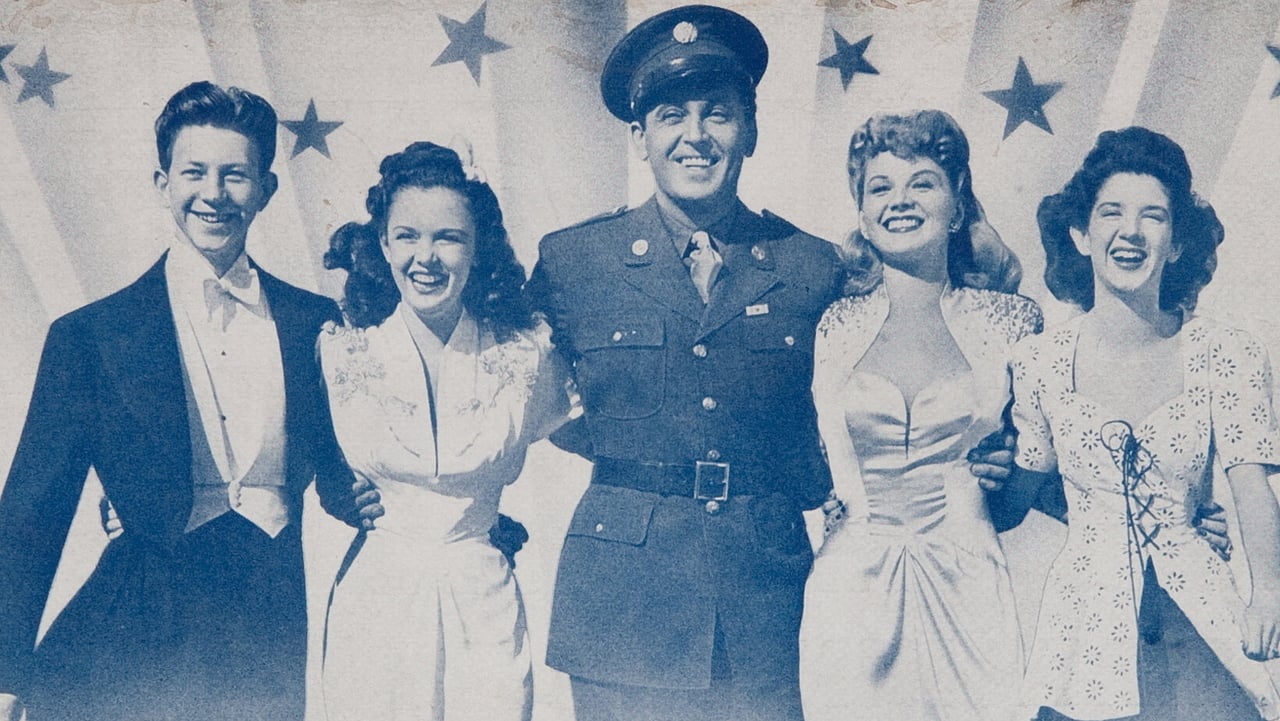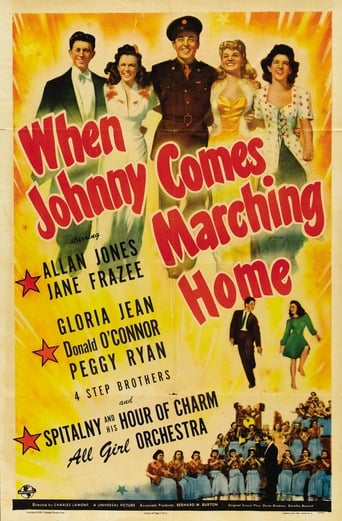

After being a little disappointed in seeing Donald O'Connor not having much of a dancing showcase in either Private Buckaroo or Get Hep to Love, it's finally gratifying seeing him really cutting the rug here with Peggy Ryan doing so many turns with him during those sequences. Operatic singer Gloria Jean also joins in with them in her more demure way. Allan Jones and Jane Frazee also sing a couple of wonderful love duets here. Then there's the luminous and exciting charm of the Phil Spitalny and his "Hour of Charm" All-Girl Orchestra with Evelyn and her Magic Violin. Also, The Four Step Brothers do tap dance up a storm with their athletic spins and somersaults. Never mind the story which relates to the World War II period, just enjoy the variety of musical performances in When Johnny Comes Marching Home. P.S. The print I saw had the final number in washed out tones with the volume a little lower though you could still hear a little clearly even then.
... View MoreAllan Jones is a war hero who comes home on sabbatical not in uniform, and the people surrounding him fear the worst in this delightfully simple musical about the challenges of war at home. He's actually on a secret assignment, and they believe he's AWOL. His younger brother (Donald O'Connor) looks up to him like a younger brother should, yet Jones is not allowed to reveal the truth about why he's home for such a long sabbatical as 10 days. While home, Jones finds a bit of romantic intrigue with sophisticated Jane Frazee who anxiously wants her younger sister (Gloria Jean) to pursue a career as a singer of classical music rather than the jazzy stuff she performs with O'Connor and their pal (Peggy Ryan, who gets to utter one of the funniest lines I've ever heard in a movie, "Let's have fun while we're still young and still have sense!"). This leads to a variety of types of music and some dance numbers that outshine some of the bigger musicals at larger Hollywood studios of the time.There's a sensational acrobatic number with the Four Step Brothers, a black dancing troop that rival the Nicholas Brothers (over at 20th) and Berry Brothers (at MGM). The musical numbers come fast and furious, and leave enough room for the plot so the film never slows down like some virtually plot less musicals of the same era did. While the songs are obscure in today's catalog of the great American songbook, they are certainly worth re-discovering. Unlike some larger budget propaganda musicals of the time, the patriotism here never seems forced, making the title appropriate as it reminds us now (as it attempted then) that freedom is something worth fighting for, and as long as men are willing to fight for it, the world will continue to rise above tyranny.
... View MoreThis B&W '42 Universal film, now viewable at You Tube, has about everything a wartime audience might wish for in a musical comedy: a well-balanced cast that provide a blend of classical ballads, hep cat teenage dancing and singing, a strong patriotic wartime presence, the impressive gymnastic dancing of the Four Step Brothers, and the novelty of an all girl orchestra and singing group.War hero Johnny Kovacs(Allan Jones) steps off a troop ship for 30 days leave in his home town(apparently NYC), but is greeted with endless speaking engagements and a bothersome infatuated young woman(Maria Shelton, as Diana Wellman). Thus, he gets permission from his commander to 'hide' from further unwanted attention by assuming his pre-war identity as singer Johnny O'Rourke. Hence, he decides to ask some previous musical friends (Flanagans) to let him room at their house for the remainder of his leave. Trouble is they only know him as Jimmy O'Rourke, and they overhear him talking on the phone about the problem that the media people haven't been informed about his little ruse, and are looking for him as a missing soldier. The Flanagans and friends thus assume Jimmy has gone AWOL, and singer Joyce(Jane Frazee), whom Jimmy likes, starts avoiding him. When detectives arrive at the Flanagan's, looking for Jimmy,teens Don O'Connor and Gloria Jean, along with Joyce, pretend they don't know where he is. But teen Peggy Ryan, who doesn't know about the assumed problem, tries to spill the beans. Their alternative ad hoc descriptions of what Jimmy looks like, summed up by Peggy's wildly contradictory statement is hilarious. When Jimmy decides to sing at a local club, the gang are afraid he will be court- martialled and executed, and try to stop him. They're too late, but finally learn that Jimmy O'Rourke is also Jimmy Kovacs, and has done nothing wrong. Everyone gets to sing or dance in the final stage show, along with some films of various servicemen and war equipment in a flag-waving grand finale.We have half a dozen featured singers, in addition to the comical exuberant dancing of Don O'Connor and Peggy Ryan, and the gymnastic and superfast tap dancing of the African American 'Four Step Brothers'. The latter had been around for nearly 2 decades, and look like they could have easily challenged Gene Kelly or an older Don O'Connor with their athletic tap dancing. They very much remind me of the Nicholas Brothers(only 2): featured dancers in a number of mostly Fox musicals of this era. They have 2 performances: one in typical Fred Astaire top hat,tux, and cane guise( more entertaining than typical Fred?). Later, in military uniform, they mock-drill to the march "American Patrol", which had been resurrected as a pop song that year by the Glenn Miller Orchestra.Don, Gloria Jean, and Peggy formed the core teen friendship group, with Don favoring Gloria as a girlfriend(as usual), but not wanting to hurt Peggy, his favorite dance partner. They perform two notable song and dance routines:"One of Us Has Gotta Go", near the beginning, and the more spectacular "Say It with Dancing", as part of the grand finale show(Both this site and the Wikipedia site wrongly ascribe this performance to stars Allan Jones and Jane Frazee). Gloria had a solo "Green Eyes" sing, sang part of the romantic ballad standard "You and the Night and the Music", along with Allan and Jane, and had a duet with Allan to "Romance". Of course, this was only one of a number of Universal films made in '42-'43 that featured at least 2 and often 3 of these charismatic teen performers.Don and Peggy would continue to form a team in several more films released in '44 and '45, before Don was drafted into military service. Meanwhile Gloria Jean was teamed with other actors in her future, mostly forgettable, Universal films, which ended in '45, as did Peggy's.First-billed Allan Jones was an established film singing star and former coal miner, who played Jimmy Kovacs/O'Rourke, and got the most singing roles, with his fine operatic voice. Besides his afore-mentioned shared songs, he had a duet with Jane Frazee to "This is it, This is Love", and began the extended group sing of the flag-waving "The Yanks are Coming Again". This song is based on the WWI Cohen "Over There" lyrics. Allan had costarred in the '36 film version ofKerns' "Showboat", and with Jeanette MacDonald, in "Firefly", and would continue his music career long after his Hollywood years ran out....Jane Frazee, as Gloria's older sister and Allan's girlfriend, also a trained singer, didn't get any solos, except as part of the duet sings, and a bit part in the group sing "This is Worth Fighting For"Part of the charm of this film is that it is one of only two feature films that included Phil Spitalny and his 'All Girl Orchestra', which had performed on radio, stage and in film shorts since '34. I must say they sounded great, including the solo trumpeter, who could have challenged Harry James, and the solo violinist. The orchestra members also presumably functioned as the all girl singing group for several songs.
... View MoreWhen Johnny Comes Marching Home Again finds Allan Jones as a hero soldier on home with some well earned leave, not only from combat, but from a bond tour where shapely débutante Marla Shelton has been sticking to him like glue. He's a fighting man under his real name, Johnny Kovacs, but everybody knows him under the name of Johnny O'Toole when he was in his civilian occupation, singer with Phil Spitalny's band.Coming home he finds that Phil Spitalny's whole orchestra is now women including new singer Jane Frazee. She's got a sister played by Gloria Jean who has a trio act going with Donald O'Connor and Peggy Ryan. O'Connor's mother Emma Dunn is Jones's former landlady and it's her place he considers home.They don't know him as Johnny Kovacs the hero, they only know him as band singer Johnny O'Rourke who enlisted in the army. And somewhere along the line they all get the idea he's gone AWOL. It makes for bulk of the plot in this fast paced musical of the World War II years.For those who aren't familiar Phil Spitalny's Orchestra in real life was an all female ensemble, very popular in the Thirties and Forties. Of course with women filling jobs in a lot of traditionally male roles, the gender of the orchestra's musicians was used for a nice gag.Composers Gene DePaul and Don Raye wrote the bulk of the score as they did for a lot of musical products at Universal. But Allan Jones had the good sense to have the Howard Deitz-Arthur Schwartz classic You And The Night And The Music interpolated in the film. His singing it with Jane Frazee and Gloria Jean is the musical highlight of the film.When Johnny Comes Marching Home is a pleasant, but dated wartime musical film. O'Connor and Ryan were teamed in several films in this era by Universal and are entertaining. And the Four Step Brothers do a nifty dance drill version of The American Patrol.If you like films of this era or you love Allan Jones's voice as I do, you'll like When Johnny Comes Marching Home.
... View More